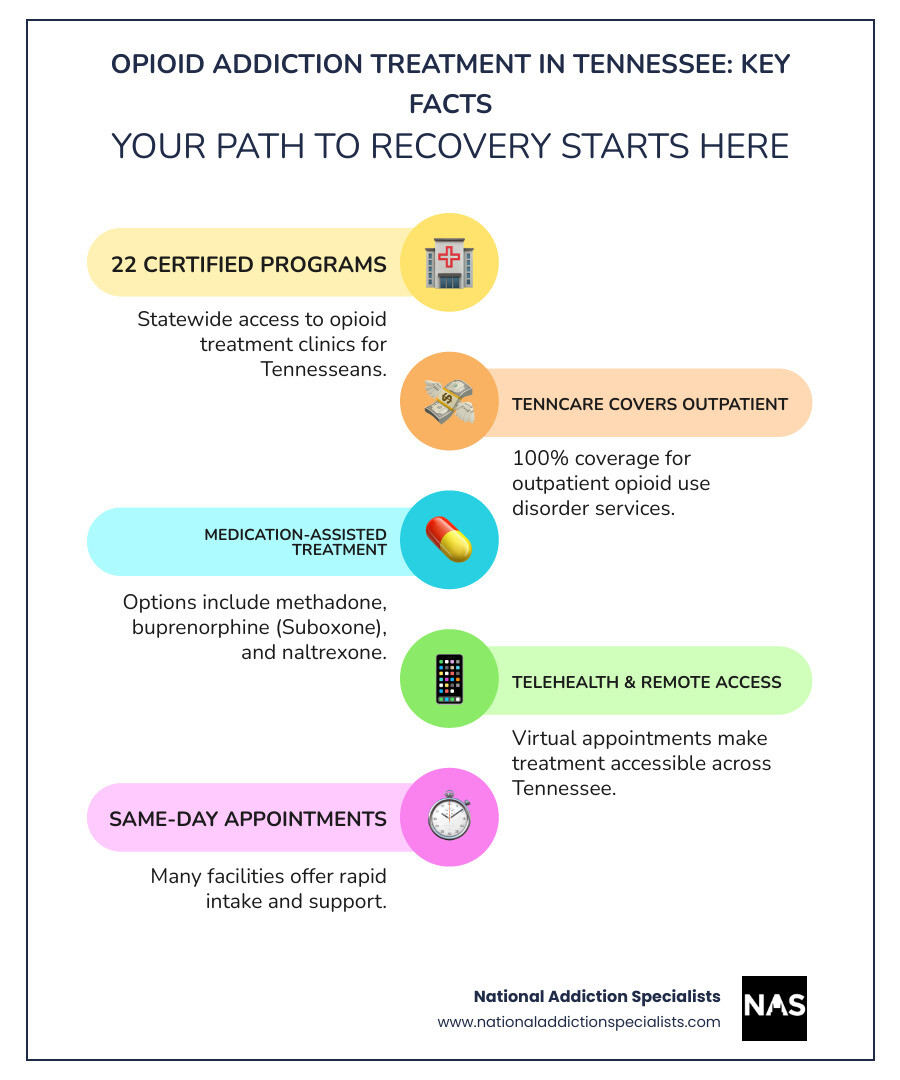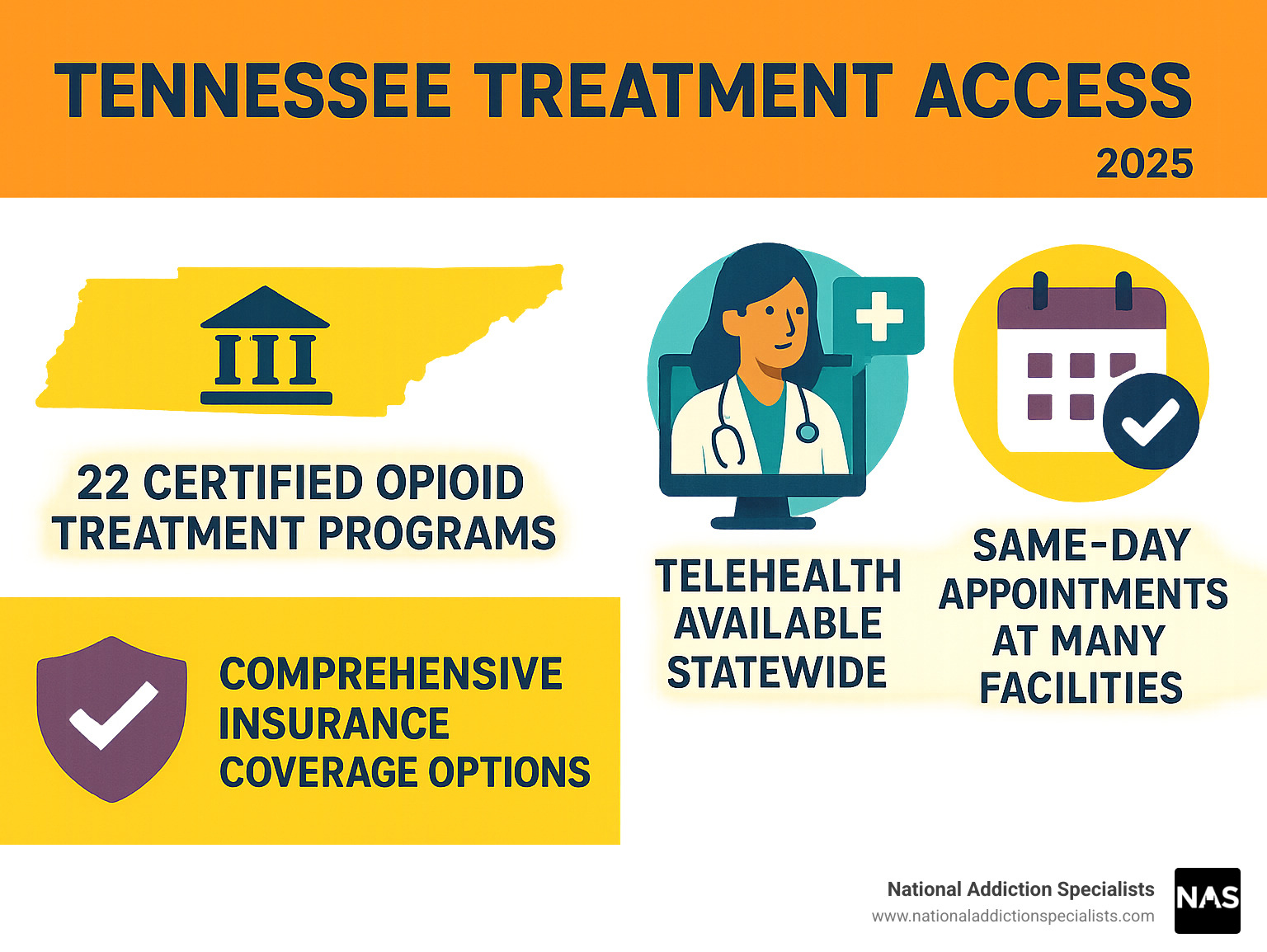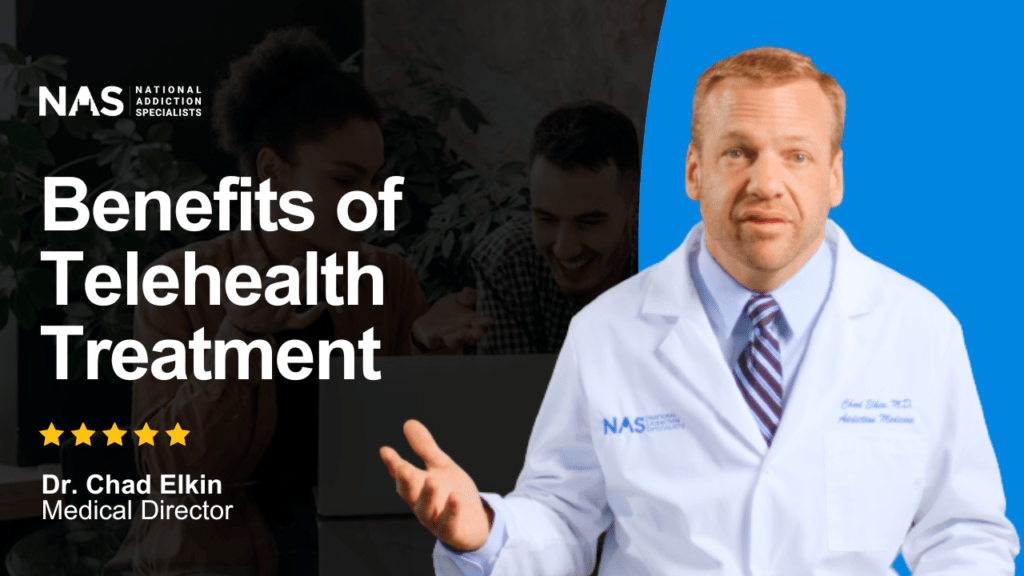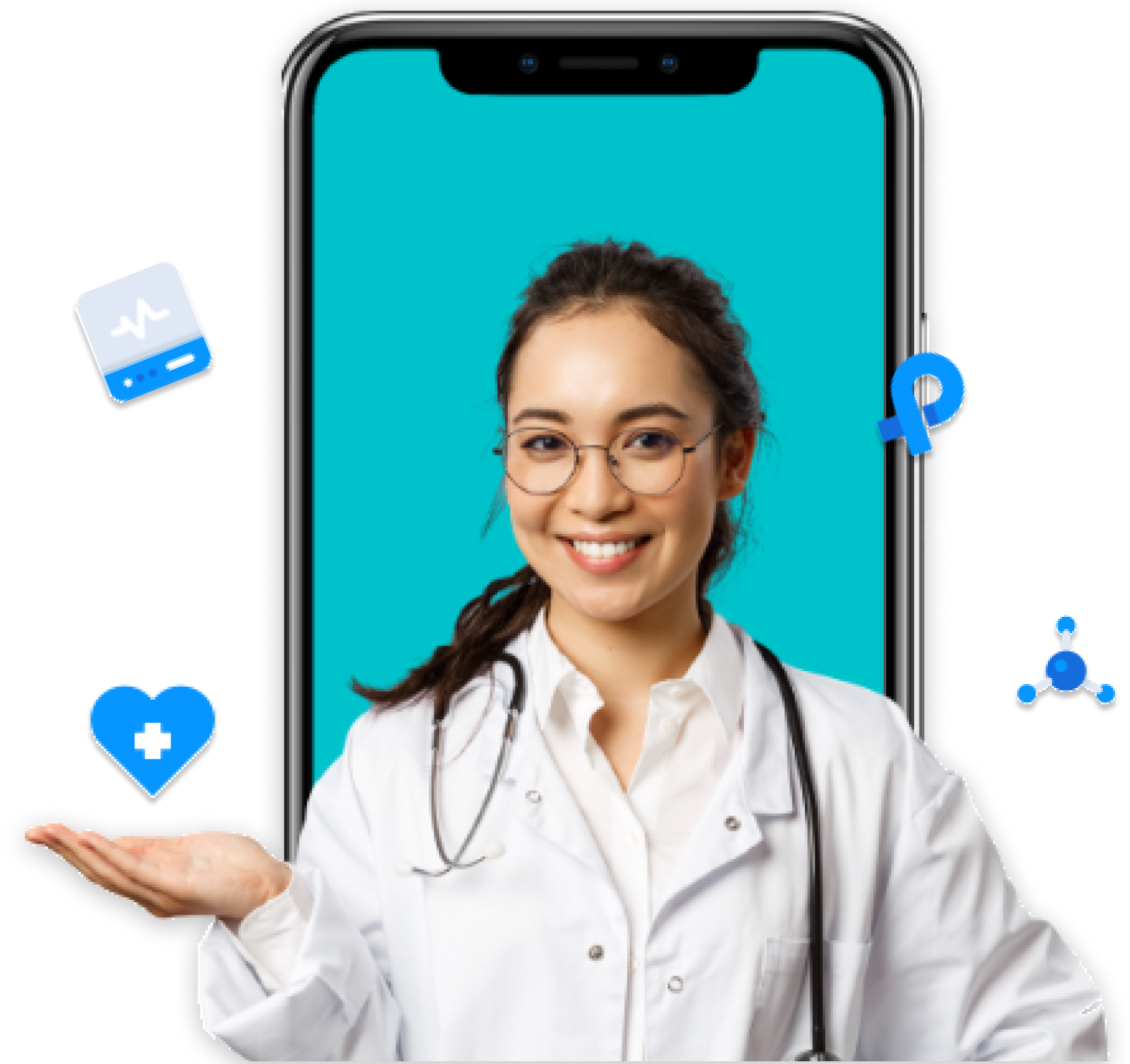Why Tennessee Needs Comprehensive Opioid Addiction Treatment
Opioid addiction treatment Tennessee programs offer hope to thousands of residents struggling with substance use disorders. With over 1 million Americans having died from overdose during the opioid epidemic, Tennessee faces a critical need for accessible, evidence-based treatment options.
Quick Overview of Opioid Addiction Treatment Options in Tennessee:
- Medication-Assisted Treatment (MAT) – Uses FDA-approved medications like methadone, buprenorphine (Suboxone), and naltrexone
- 22 certified opioid treatment programs currently operating across the state
- 100% TennCare coverage for all outpatient opioid use disorder services
- Telehealth options available for remote treatment access
- Same-day appointments offered at many facilities
- State-funded programs for those meeting income requirements (133% of federal poverty guidelines)
The opioid crisis has devastated Tennessee communities, with prescription painkillers like oxycodone and hydrocodone leading many to illicit substances like heroin and fentanyl. But recovery is possible with the right treatment approach.
As one patient shared: “Today, I do not feel as though a pill controls my life. I control it.” This change happens when people access comprehensive care that addresses both the physical and psychological aspects of addiction.
Effective treatment combines:
- Medical supervision for safe withdrawal
- Counseling and behavioral therapies
- Peer support and community resources
- Long-term recovery planning
I’m Chad Elkin, a board-certified addiction medicine physician and founder of National Addiction Specialists, with extensive experience providing opioid addiction treatment Tennessee residents through evidence-based medication-assisted treatment and telehealth services.

Opioid addiction treatment Tennessee further reading:
- suboxone clinic Tennessee
- suboxone clinics in tennessee that take insurance
- suboxone doctors cookeville tn
Understanding the Opioid Crisis in Tennessee
Tennessee’s opioid crisis began with well-intentioned medical care but evolved into a public health emergency. Doctors prescribed powerful painkillers like oxycodone and hydrocodone for legitimate pain management. Over time, many patients developed physical dependence as their bodies needed higher doses for the same relief.
When prescription regulations tightened, some people turned to street drugs like heroin and fentanyl – substances far more dangerous than prescription medications.
Fentanyl has changed everything. This synthetic opioid is 50 to 100 times stronger than morphine and often appears in drugs without users’ knowledge, making every use potentially fatal.
The impact ripples through communities – families struggle to help loved ones, emergency rooms see more overdoses, and crime rates climb. However, Naloxone (Narcan) can reverse opioid overdoses and save lives, serving as a bridge until people can access opioid addiction treatment Tennessee programs.
Scientific research on opioid use disorder shows addiction is a medical condition, not a moral failing.
What Is Opioid Addiction?
Opioid addiction occurs when your brain adapts to powerful substances. Opioids attach to brain receptors, blocking pain and releasing dopamine. Your brain compensates by producing less natural feel-good chemicals, creating dependence.
Tolerance develops as your brain requires more medication for the same effect. Physical dependence means your body needs the opioid to function normally, causing withdrawal without it.
Importantly, physical dependence differs from addiction. Someone with cancer might be physically dependent on prescribed pain medication but use it appropriately. Addiction involves compulsive use despite harmful consequences.
Most Misused Opioids in TN
Prescription opioids commonly leading to problems include oxycodone (OxyContin, Percocet), hydrocodone (Vicodin, Norco), codeine (cough syrups), and morphine (hospital settings).
Illicit opioids often replace expensive prescription pills. Heroin became popular due to lower cost and availability. Fentanyl has made everything more dangerous – an amount smaller than salt grains can cause overdose. Drug dealers mix it into other substances because it’s cheap and powerful, but users often don’t know it’s present.
Effective opioid addiction treatment Tennessee programs understand these challenges and offer evidence-based solutions for recovery.
Opioid Addiction Treatment Tennessee: Evidence-Based Paths to Recovery
Opioid addiction treatment Tennessee programs offer comprehensive, evidence-based care custom to individual needs. The treatment continuum begins with assessment, may include medically supervised detox, followed by active treatment combining medication with counseling.
Medication-Assisted Treatment (MAT) forms the foundation of effective treatment, combining FDA-approved medications with counseling. MAT normalizes brain chemistry, blocks euphoric effects, relieves cravings, and helps restore normal function.
Detoxification alone rarely leads to lasting recovery. Counseling and behavioral therapies develop healthy coping skills, identify triggers, and rebuild relationships. Programs treating dual diagnosis address both addiction and mental health conditions simultaneously.
| Medication | Type | How It Works | Setting |
|---|---|---|---|
| Methadone | Full opioid agonist | Prevents withdrawal, reduces cravings | Certified OTP clinics only |
| Buprenorphine | Partial opioid agonist | Reduces cravings, blocks euphoria | OTP clinics and office-based |
| Naltrexone | Opioid antagonist | Blocks opioid effects completely | Any healthcare setting |
Medication-Assisted Treatment (MAT) in Tennessee
Tennessee’s 22 certified opioid treatment programs provide access to all three FDA-approved medications.
Methadone prevents withdrawal and reduces cravings without euphoria. Federal regulations require daily clinic visits initially, with take-home privileges earned over time.
Buprenorphine offers more flexibility through office-based prescribing. Its “ceiling effect” limits breathing depression, reducing overdose risk compared to full agonists.
Naltrexone blocks all opioid effects. Available as daily tablets or monthly injections, it requires complete detox before starting to avoid precipitated withdrawal.
MAT medications aren’t “trading addictions” – they’re prescribed treatments allowing brain healing while maintaining normal function.
More info about Medication Assisted Treatment Tennessee
Suboxone for Opioid Addiction Treatment Tennessee
Suboxone combines buprenorphine and naloxone, offering effective outpatient treatment. Buprenorphine prevents withdrawal and cravings without euphoria, while naloxone deters misuse by causing withdrawal if injected.
Advantages include office-based treatment, reduced overdose risk, flexible scheduling, and effective symptom control. Treatment follows induction, stabilization, and maintenance phases.
More info about Suboxone for Opioid Addiction
Detox & Withdrawal Management
Withdrawal symptoms begin 6-12 hours after short-acting opioids, 12-30 hours for long-acting ones. Peak symptoms occur days 1-3 for short-acting, days 3-5 for long-acting opioids.
Common symptoms include:
- Muscle aches and pains
- Nausea and vomiting
- Diarrhea
- Runny nose and tearing
- Insomnia
- Anxiety and depression
- Intense cravings
Medical supervision ensures safety and comfort through comfort medications. However, beginning MAT often proves more effective than complete detoxification.
Counseling & Behavioral Therapies
Cognitive Behavioral Therapy (CBT) helps identify and change thought patterns contributing to substance use. Motivational Interviewing explores personal motivation for change. Group therapy provides peer support and shared learning. Family counseling repairs relationships and teaches healthy boundaries.
Dual Diagnosis Care
Many seeking treatment also struggle with depression, anxiety, PTSD, or bipolar disorder. Integrated treatment addresses both conditions simultaneously, recognizing untreated mental health issues increase relapse risk. Trauma-informed care emphasizes safety and empowerment for healing.
Accessing Care: Finding the Right Program and Paying for It
Opioid addiction treatment Tennessee options include inpatient treatment with 24/7 medical care for severe cases, and outpatient treatment allowing you to maintain responsibilities while receiving care. Telehealth services remove barriers like transportation, making treatment accessible statewide.
Provider locator tools include SAMHSA’s treatment locator, Tennessee state directories, and insurance provider networks. TennCare provides 100% coverage for all outpatient opioid addiction treatment, eliminating out-of-pocket costs. State-funded programs serve adults at or below 133% of federal poverty guidelines.
More info about Telehealth Suboxone Treatment
How to Choose an Opioid Addiction Treatment Tennessee Program
Look for licensing and accreditation including state licensing, CARF accreditation, or Joint Commission certification. Consider treatment philosophy – medical model with MAT, 12-step approaches, faith-based, or holistic programs.
Ensure services offered match your needs: dual diagnosis treatment, family therapy, aftercare planning. Practical considerations include location, insurance acceptance, and appointment availability. Many programs offer same-day intake recognizing urgency of treatment needs.
Verify staff qualifications including board-certified physicians, licensed counselors, and peer recovery specialists.
Affordable & State-Funded Options
State-funded programs serve uninsured individuals or those with limited income. Sliding scale fees adjust based on ability to pay. Grant funding helps cover costs for qualifying individuals.
TennCare coverage is comprehensive, covering medications, visits, counseling, and supporting services at no cost to members. This eliminates financial barriers that previously prevented treatment access.
Insurance & Financial Assistance
Medicaid and TennCare offer excellent coverage with no out-of-pocket costs for outpatient services. Medicare covers addiction treatment including MAT and counseling. Private insurance varies by plan – check network providers, deductibles, and prior authorization requirements.
Self-pay options include reduced cash rates, payment plans, and scholarship funds. Employee assistance programs may provide initial assessment and referral services.
At National Addiction Specialists, we accept Medicaid and Medicare, providing accessible telemedicine-based Suboxone treatment throughout Tennessee.
Make an Appointment to Treat Addiction
Please don’t hesitate. Make an appointment today.
Life After Treatment: Relapse Prevention, Family Support, and Stigma Reduction
Recovery from opioid addiction treatment Tennessee programs begins a lifelong journey. Aftercare planning creates safety nets before you need them, including continued medication management, counseling check-ins, and peer support groups.
Peer support provides understanding from those who’ve walked similar paths. Naloxone training teaches life-saving overdose response skills. Community resources include 12-step meetings, SMART Recovery, faith-based programs, and recovery community centers.
Long-Term Recovery Tools
Sober living facilities bridge treatment and independent living through structured community support. Alumni programs maintain connections with treatment facilities and recovery communities. Tele-counseling provides ongoing support, especially valuable for rural Tennessee residents. Recovery coaching offers personalized guidance for specific goals.
Technology supports recovery through mobile apps, online communities, and digital therapy platforms providing 24/7 resources.
Supporting Loved Ones & Fighting Stigma
Families need education about addiction as a medical condition, changing blame into compassion. Positive language using person-first terminology maintains dignity. Family therapy repairs relationships and teaches healthy boundaries.
Support groups like Al-Anon help families heal from addiction’s trauma. Advocacy efforts change policies and attitudes, expanding treatment access and reducing discrimination.
Stigma reduction requires ongoing community effort. When we share recovery stories and treat addiction medically, we create environments where people feel safe seeking help.
Scientific research on opioid overdose response provides evidence-based overdose response information that saves lives.
Frequently Asked Questions about Opioid Addiction Treatment in Tennessee
What are the signs and symptoms of opioid addiction?
Opioid addiction manifests through physical, behavioral, and psychological symptoms. Physical signs include tolerance, withdrawal symptoms, and physical dependence.
Behavioral indicators:
- Using beyond prescribed amounts
- Doctor shopping for multiple prescriptions
- Continued use despite consequences
- Neglecting responsibilities
- Financial problems obtaining drugs
Psychological symptoms:
- Intense cravings
- Preoccupation with obtaining drugs
- Mood swings and irritability
- Depression and anxiety
- Denial about problem severity
Early recognition enables prompt intervention and better outcomes.
How does Medication-Assisted Treatment work?
MAT combines FDA-approved medications with counseling to treat opioid use disorder. Medications normalize brain chemistry, block euphoric effects, relieve cravings, and support normal function.
Methadone prevents withdrawal and reduces cravings through daily clinic visits. Buprenorphine offers office-based treatment with reduced overdose risk. Naltrexone completely blocks opioid effects through daily tablets or monthly injections.
MAT isn’t “trading addictions” – these prescribed medications allow brain healing while maintaining normal life function.
Where can I find a clinic near me?
Tennessee resources include:
- Tennessee Department of Mental Health provider directory
- SAMHSA treatment locator website
- TennCare provider directory
- Professional organization member directories
For immediate help:
- Tennessee Crisis Line: 1-855-CRISIS-1
- SAMHSA National Helpline: 1-800-662-4357
- National Addiction Specialists for telemedicine treatment
Many programs offer same-day appointments. Telemedicine options make treatment accessible statewide.

Conclusion
Opioid addiction treatment Tennessee programs offer genuine hope for recovery. With 22 certified programs, comprehensive TennCare coverage, and expanding telemedicine options, help is more accessible than ever.
Recovery requires evidence-based treatment addressing both physical and psychological aspects of addiction. Medication-assisted treatment combined with counseling and peer support creates lasting recovery foundations.
Your next steps:
- Contact a treatment provider for assessment
- Verify insurance coverage or explore funding options
- Begin treatment with medical supervision
- Engage in counseling and peer support
- Develop a long-term recovery plan
Make an Appointment to Treat Addiction
Please don’t hesitate. Make an appointment today.
At National Addiction Specialists, we provide opioid addiction treatment Tennessee residents need through personalized, telemedicine-based Suboxone treatment. Our approach combines medication-assisted treatment with counseling support, accessible from home.
We accept Medicaid and Medicare, making treatment affordable and accessible without transportation barriers or time off work.
More info about Online Suboxone Clinic services and telemedicine support.
Addiction is a medical condition, not a moral failing. Treatment works, recovery is possible, and you don’t have to face this alone. Tennessee has resources to help you reclaim your life from opioid addiction.
This article was medically reviewed by:
Chad Elkin, MD, DFASAM is a board-certified addiction medicine physician, founder, and Chief Medical Officer of National Addiction Specialists, dedicated to treating substance use disorders. A Distinguished Fellow of the American Society of Addiction Medicine (ASAM), Dr Elkin currently serves as President of the Tennessee Society of Addiction Medicine (TNSAM) and has held various leadership roles within the organization. Dr Elkin chairs ASAM’s Health Technology Subcommittee and is an active member of its Practice Management and Regulatory Affairs Committee, State Advocacy and Legislative Affairs Committee, and other committees. He also serves on the planning committee for the Vanderbilt Mid-South Addiction Conference. Committed to advancing evidence-based policy, Dr Elkin is Chairman of the Tennessee Association of Alcohol, Drug, & Other Addiction Services (TAADAS) Addiction Medicine Council, which collaborates with the TN Department of Mental Health & Substance Abuse Services (TDMHSAS). He has contributed to numerous local, state, and national task forces, helping develop professional guidelines, policies, and laws that align with best practices in addiction medicine. His work focuses on reducing addiction-related harm, combating stigma, and ensuring access to effective treatment. Passionate about the field of addiction medicine, he remains dedicated to shaping policy and enhancing patient care.
Suboxone® and Subutex® are a registered trademark of Indivior UK Limited. Any mention and reference of Suboxone® and Subutex® in this website is for informational purposes only and is not an endorsement or sponsorship by Indivior UK Limited.











